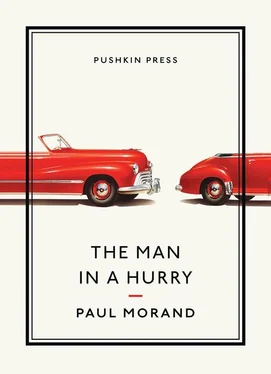They would lose themselves in the company of Cocteau who, to hear him talking about his circle of friends, lived in a kindergarten filled with Loulous, Jeannots, Francettes, Zizis, Dédés… I forget, having failed to ask him, which infantile names he used for Stravinsky, Diaghilev, Picasso or perhaps… Einstein.
I notice you have begun to use the familiar tu form of address. As a respectful friend I should not display too much humility, even though I find it hard to use tu myself, but anyway… let’s try. Your time clock stopped at eighty-eight years. Mine also stands at eighty-eight. We are therefore on a relatively equal footing. It’s worth pointing out that this number eight has clung to you since your birth. In 1988, you would have reached a century. Reduced to ashes, you have remained tremendously fruitful. I should have made a note of everything that has been published: new editions, unpublished work, updated material, correspondence, preparations for a Pléiade edition, and the Journal inutile . You have probably never been so much in the public eye since you left us. The volumes of my Morand collection bristle with yellow bookmarks. If I pick up any of your books at random, one of these bookmarks unveils a sentence that catches the eye:
“I should like to die at the age of eighty-seven, thus a further two years of reasonable life, although without much interest.”
The trouble is that one doesn’t make up one’s mind about anything apart from considering suicide as a cowardly but comfortable solution. In this context, who, from the age of five, has not wanted to hang himself time and again, to bleed himself dry or to drown? Our most enduring sorrows stem from childhood. The rest of existence is spent either defying them or rectifying ruins. Oh, I know, remorse, regret and alarm signals blight our later years, but I can see, in your case — apart from brief confessions in which everything is played down — some wonderfully ribald stories: “… sperm still abundant”.
Life spoilt you. Even the little games at the Académie amused you. Having taken your seat much later than me, you didn’t have time to become blasé or even get irritated. Elected in 1968, you died in 1976, barely eight years later (still that dreaded eight) whereas I accrued thirty years of attendance beneath the Coupole, from 1978 to 2008, in the eighth fauteuil .‡ Yet another eight, a sign of fate that should not be overlooked. Of those who took their seats with you, there are only four survivors: Druon, Ormesson, Lévi-Strauss, Marceau.§ The secret plotting and the political-literary manoeuvring that went on did not have time to tarnish your satisfaction, following two rebuffs, at being one of the forty. Hélène cared about the Académie as much as you did, if not more. Beneath the aura of the Immortel , there is a ferocious struggle for seats at the table. There are certainly the beginnings of many violations of protocol, and hostesses no longer know by heart the dates of election which the hierarchy determined. You did not serve as a young Protocol Attaché in London (1917) without soon understanding the sensitivity of a milieu that frequently has no other proof of its existence on earth. A photograph of you, probably taken in London, shows you in uniform: white silk trousers, shoes with buckles, tailored frock coat. A visiting card is clipped to it: “Paul Morand, Attaché au Protocole” and, below, in your own handwriting: “What a pretentious young man!”
I never enquired about your behaviour during the sessions at the Académie, at the entrance to the hall and on the way out. Did you maintain the traditional silence of the “newcomer” for a year and only speak when you were asked? Did you, at a doorway, allow Jules Romains or Guéhenno to pass first? They loathed you and led a fairly spiteful campaign against your election. The letter which I partially quoted — the rest will come at the end — refers to a brief episode in the guerrilla warfare that our colleagues waged. In his response to the speech made by Maurice Schumann (I should say his “thanks”, according to our rules) the duc de Castries could not stop himself making a cutting remark about the spokesman for Radio-Londres during the war. It was true to tradition and the malicious Castries did not miss his opportunity.
One imagines you being rather discreet, adopting a mounting hardness of hearing out of reticence unless, as Ramón Fernandez suspected in an article in La NRF (1941): “One senses a kind of timidity about Morand, which explains a good deal.”
Wherever you happen to be, your first “timid” reflex is to discover how to get out of the trap. At the Académie this can be somewhat complicated unless one is struck off, a rare event over almost four centuries. Ancient traditions protect us from Supreme Power just as Supreme Power protects us from the rules of the Kings’ Courts. A pity that the Académie should suffer from the vices of democracy over its elections. Your friend and protector, Philippe Berthelot, under whose direction you started out at the Quai d’Orsay during the First World War, said that “democracy is the right of fleas to devour lions”.
I’ve been dipping into Journal d’un attaché d’ambassade (1916–1917) , that contemptuous indictment of one of the myths of our time, a myth that has unleashed so many terrible wars and buried entire civilizations. Your pessimism is reassuring. In this diary, maintained so methodically when a hectic life left you with little time to sleep, your mind was quick to seize the core of the matter: the confusion of a nation involved in the first of the great massacres of the twentieth century which was governed by men who behaved as though they were running an electoral campaign. We remain in the wings, the main stage is obscured. Pot-bellied, superfluous generals pass through, at times covered in laurels, at others treated as codgers and fools.
Where are you during this tragedy? While a charnel house is being constructed at Verdun, you are at the Medrano Circus watching an act in which performing geese do a Spanish dance. The Ministry hasn’t sent you there, that Ministry in which you are the perfect civil servant, skilfully organizing your free time. At lunchtime or dinner the chances are that you can be spotted at the Ritz, the Crillon, at La Pérouse or Maxim’s. Wealthy and often titled ladies, already in possession of highly secret decisions made by the Cabinet who sat that very morning, hold open table. Marcel Proust joins you for the pudding course. Rationing isn’t much of a problem. On the two days a week without meat, you console yourself with lobster and fish. If there’s no white wine, you drink champagne. A young and extremely rich Romanian girl, a princess moreover through her first marriage, entertains a great deal and is invited on other days to join the inner circle. Her shrill, peremptory voice is not frightened of coming out with outrageous remarks. Some of her utterances seem to you Heaven-sent: “A man who is not unfaithful to his wife is not a man.”
So might marriage not be a prison after all? A door still remains open. They go out to admire the moonlight and they return at breakfast time. Who would not jump at such a guarantee?
At times, you embarrass your staunchest friends. The deftness with which you escaped the butchery of 1914–18 leaves an unpleasant taste. Your friend Valery Larbaud, ruled out of active service on account of his bad health, offered his services for several months emptying chamber pots and serving meals on trays in a Vichy hospital before taking refuge in Spain, in Alicante, to work on his book. The family he lodged with included some very lively young girls. They made him run a few risks, rather less serious ones than those experienced in the trenches by the men of his generation, but nevertheless… How we might have wished that Péguy, Alain-Fournier, Codet and so many others could also have escaped the slaughter! The sacrifice of your life — or even just a left arm, which your friend Giraudoux considered a lesser evil — would not have shortened the endless killing by a single day. Your death, on the other hand, would have deprived the age of a portraitist so brilliant that he might have been taken for its creator.
Читать дальше












